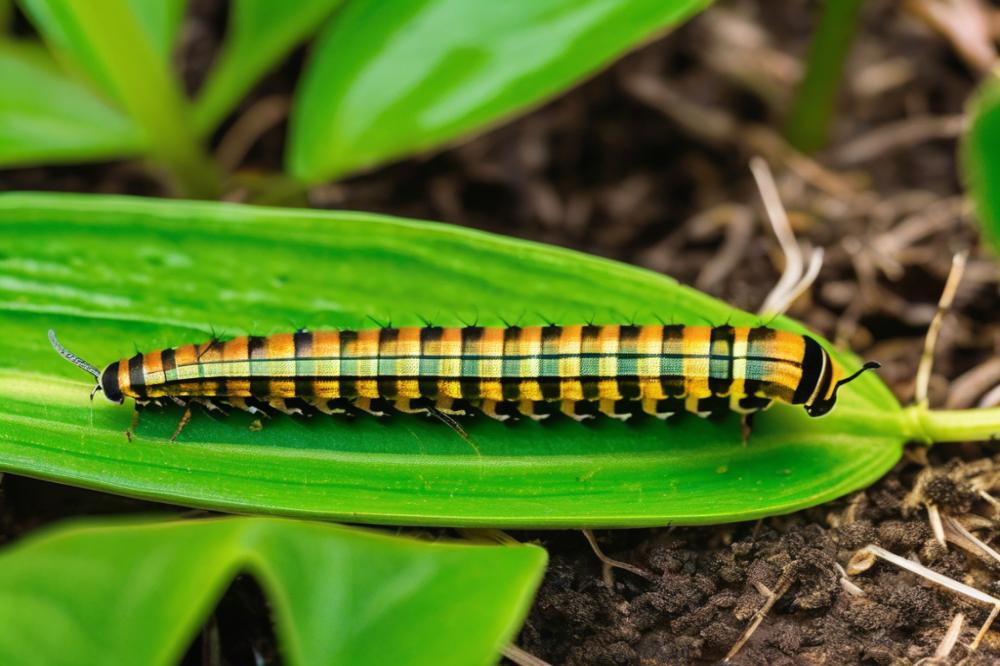Protecting Your Garden from Armyworms
Armyworms are notorious garden pests known for their voracious appetite. These small caterpillars can swiftly ravage your plants, leaving behind a trail of destruction. Often mistaken for caterpillars of a specific type of moth, the larvae are particularly destructive during their feeding stage. Understanding their behavior is vital for any gardener. Without proper management, these pests can cause significant damage to your beloved garden.
Control methods for armyworms are essential for maintaining healthy vegetation. A compromised garden not only affects the aesthetics but can also hinder plant growth and yield. Early detection plays a crucial role in mitigating their impact. Identifying the signs of armyworm infestation allows for prompt action, helping to safeguard your garden. Effective pest management involves a combination of prevention strategies, treatment solutions, and consistent garden maintenance.
This article will explore various approaches to handle armyworms. We will examine organic methods that are safe for both the environment and your plants. Insecticides can be potent tools, but they come with their own set of considerations. Understanding when and how to use them is vital. By following the guidelines presented here, you can protect your garden from these harmful pests and promote a thriving green space.
Understanding Armyworms


Identification of Armyworm Larvae and Adult Moths
Recognizing armyworms is crucial for effective management. These pests start as larvae, often appearing in shades of green, brown, or even black. Typically, they measure about 1.5 to 2 inches long. Look for a distinctive stripe along their bodies. Adult moths are another story. They have a wingspan of around 1.5 inches and display a mottled brown color. When disturbed, the larvae tend to curl up or drop to the ground, which can make spotting them tricky.
Life Cycle of Armyworms and Their Feeding Habits
Armyworms undergo a complete transformation. After hatching, the larvae feed voraciously on garden plants. Their life cycle includes several instars or stages, during which they grow rapidly. In just a couple of weeks, they can cause remarkable damage to your vegetation. The preference for young, tender leaves makes them a threat to many gardens. During their feeding frenzy, they are capable of stripping plants down to the stems.
Common Plants Affected by Armyworms
A variety of plants suffer from armyworm infestations. Lawns, corn, and several vegetables are particularly vulnerable. Ornamental plants can also fall victim to these pests. Damage may start with noticeable chewing on leaves, leading to more severe consequences. Observing the signs early is essential for effective pest management. Regular garden maintenance helps in mitigating their impact. If you notice wilting or irregular holes in your plants, it’s time for early detection measures.
prevention Measures


Armyworms can ruin your plants quickly if you don’t act proactively. First, a strong routine of garden maintenance plays a crucial role in preventing infestations. Regularly inspecting your garden helps catch problems before they escalate. Weeds are common hiding spots for pests, so keeping your garden tidy is essential.
Another effective strategy is crop rotation. Change the locations of your crops each season. Armyworms often prefer certain plants. By growing a diverse range of vegetation, you create a less inviting environment for these larvae. This practice can break the life cycle of pests and promote healthier soil.
Choosing resistant plant varieties is smart as well. Some plants naturally deter pests. Research which species offer resistance against armyworms and incorporate them into your garden. These selections can significantly boost your chances of survival against infestations.
Watering and fertilizing techniques influence the health of your plants too. Over-watering can create conditions that foster pests. On the other hand, under-watering stresses plants, making them vulnerable. Use consistent amounts of nutrients to maintain robust, healthy plants. Strong plants are less susceptible to pest attacks.
Implementing these strategies fosters a balanced ecosystem in your garden. Early detection of problems enhances pest management efforts. Pay attention to any signs of armyworms or damage. With diligence and care, you can safeguard your garden using various organic methods. Insecticides also remain an option, but should be used thoughtfully. Effective management requires layering multiple techniques to achieve the best results.
Early Detection of Armyworms


Recognizing the signs of armyworm infestations is essential for timely intervention. Look for damaged leaves; they may have irregular holes or brown edges. Lettuce and other tender plants often show the first signs of distress. Furthermore, nighttime activity may reveal the presence of these pests as they come out to feed.
Regular garden inspections and monitoring can make a significant difference in pest management. Check your plants frequently, especially those that are young and vulnerable. Inspect the undersides of leaves, as armyworm larvae often hide there during the day. Early detection allows for prompt treatment, potentially saving your vegetation from severe damage.
Utilizing traps can serve as an effective method for early identification. Setting up bait traps can attract armyworms, helping you gauge their presence. Using pheromone traps can also provide a unique way to monitor adult moth activity. Both methods offer a proactive approach, allowing you to respond before an infestation spreads.
Garden maintenance is key to reducing the chances of armyworms taking hold. Cultivating strong, healthy plants can withstand pest damage better. Consider applying organic methods that deter pests naturally, making your garden less appealing to them. Insecticides can be effective but should be used with caution and preferably in combination with other tactics.
By being vigilant and knowledgeable, you can protect your garden from armyworms before they become a larger threat. Remember, prevention is always better than treatment. Staying aware of changes in your garden can help you in your fight against these troublesome pests.
Treatment Options


Protecting your garden from armyworms involves various treatment methods. Each option has unique benefits, and combining approaches can yield better results.
Organic Methods for Armyworm control
Natural predators play a key role in pest management. Birds, wasps, and other beneficial insects can keep armyworm larvae in check. Introducing these helpful creatures into your garden can establish a balance that reduces pest populations. You can attract birds with feeders and provide habitats for beneficial insects by planting diverse vegetation.
Homemade insecticidal soaps and sprays offer another alternative. Simple recipes using household ingredients, like liquid soap mixed with water, can target unwanted pests. Spraying affected plants directly can disrupt larvae while being gentle on your vegetation. Always test these mixtures on a small area first to ensure they don’t harm your plants.
Chemical Insecticides and Their Proper Application
Many gardeners prefer chemical insecticides for quick results. When using these products, following the manufacturer’s instructions is crucial. This ensures safety for both plants and humans. Apply insecticides during cooler parts of the day to minimize harm to beneficial insects. Accuracy during application also helps avoid overspraying other areas.
Best practices are essential for safe usage. Ensure you wear protective gear, including gloves and masks, to prevent exposure. After application, avoid entering treated areas for the recommended period to allow chemicals to settle. Always store insecticides out of reach of children and pets to maintain safety.
Regular garden maintenance can also alleviate problems. Inspect plants frequently for signs of armyworm activity, such as eaten leaves or droppings. Early detection makes a significant difference and increases treatment effectiveness. Keeping your garden healthy will create a less favorable environment for future infestations.
Integrated Pest Management
Protecting your garden from armyworms involves much more than just using chemical sprays. Effective strategies require combining prevention techniques, early detection methods, and various treatment options. Each component plays a crucial role in maintaining healthy plants.
Monitoring your garden regularly is essential. Look for signs of larvae munching on leaves or webs spun by these pests. Early detection helps catch infestations before they become severe. Garden maintenance routines should include a visual check of your plants to spot any unusual damage. Noticing the problem early can save your vegetation.
Adapting pest management strategies can make a significant difference. Every garden is unique, with different plants and climates affecting how armyworms behave. A single method may not work for every situation. Instead, consider a mix of organic methods and insecticides. These approaches can work together to control the issue effectively.
It’s valuable for gardeners to educate themselves about these pests. Knowledge empowers individuals to take action against threats in their gardens. Workshops, local gardening clubs, and extension services offer great resources. Learning about the lifecycle of armyworms and the best treatment options will improve your chances of keeping your garden thriving.
Many gardeners find that combining natural and chemical solutions works best. Organic methods can include introducing beneficial insects that prey on armyworm larvae. Using insecticides may also be necessary when infestations are large. Finding the right balance between these strategies is key to success.
Employing integrated pest management isn’t just about fighting pests. It’s about creating a healthy ecosystem in your garden. Healthy plants can often better withstand mild infestations. Keep your garden diverse and resilient to help minimize the impact of any pests.
Final Thoughts on Protecting Your Garden
In recapping the various strategies for Armyworm control, it’s clear that vigilance is essential. Regular inspections of your plants, combined with introducing beneficial insects, can make a significant difference. Natural pesticides can aid in effective treatment when necessary, while maintaining a healthy soil environment fortifies plant resilience.
Proactive measures are key to keeping your garden thriving. Consider crop rotation and planting resistant varieties as part of your routine. These practices not only discourage armyworms but also promote overall garden health. Commit to a consistent monitoring schedule. Catching issues early can save you time, effort, and resources later on.
Maintaining a watchful eye against common garden pests will pay off in the long run. Awareness of armyworm signs, along with their life cycle, arms you with valuable knowledge. Use this understanding to act decisively. Remember, prevention is always more effective than dealing with a full-scale infestation.
Ultimately, a thriving garden requires care and attention. Put your plans into action, and you’ll see the benefits unfold. Enjoy the beauty of your garden while confidently safeguarding it from threats.



